Books
House Is an Enigma
Poetry
Originally published by Southeast Missouri State University Press, 2018, now available from Bull City Press
Available for purchase from Bull City Press, Amazon, Target, Barnes and Nobles, and other retailers.
The winner of the 2017 Cowles Poetry Book Prize, House Is an Enigma is an investigation of the language used to house descriptions of the body, which so often seek to define and determine the boundaries and behaviors of the spirit that lives within. Written after Bolden’s radical hysterectomy, during which she noted her doctors’ use of house metaphors to describe her body and discuss her inability to have children, these stunning poems set out to expose the fissures in the foundations of the language we use to define human bodies and their behaviors, using these cracks as a lens through which she can see her own body, at last, as her own flawed but beautiful home.
“House Is An Enigma is a staggering achievement. These poems worry several stones in their pockets—grief and the body, certainly, rubbing both until they gleam—but also language and its deliciously endless possibilities. What can I say but that the mind whirring inside these poems, this beautiful lyric-building mind, is one I wish were housed in my own skull? What can I say but give yourself over to these poems, and if you’re very, very lucky, some of Emma Bolden’s genius may seep into you—and leave you, too, irrevocably changed.”
—Maggie Smith, author of Good Bones
Emma Bolden’s gorgeous poems brilliantly remind me of learning to draw with colored pencils. To make a pencil drawing really stand out, one must begin with the lightest of touches and unexpected colors—like say, lavender—for a banana. Her poems ache with intelligence while layering desire, melancholy, and a delicate grief—and before you know it, we are transported to years where “we wore leather & guitar music sweet with distortion,” and savored “the taste of peppermint bright as teeth.” Bolden’s poems are visceral and profoundly precise—all while balancing a quiet playfulness and dazzle of color that I know I’ll return to again and again.
— Aimee Nezhukumatathil, author of Oceanic
Emma Bolden writes:“House doesn’t care about your intentions, your repairs. House dares/you.” Every poem in House is an Enigma is a dare –a window opening to a gorgeous room or century, a terrifying or luminous sky. It is also a brilliant, inventive, and deeply-felt exploration of loss – namely, the potential for motherhood and all that future-imagining might entail. Filled with ghosts, skywriters, skulls, mouths, and fragile crinoline beauty, these poems dwell in the liminal space of self-questioning and what it means to inhabit an imperfect female body. Can one separate the body’s lost creative potential from language itself? What are we without our imagining? If the poet is cut off from the metaphor of the body as a home/house, what is there? But Bolden’s questioning is not devoid of life, love, or longing – quite the opposite. Please open yourself to Bolden’s witchy, wise, and breath-taking vision — what’s possible for all of us in the long hallways of our hearts.
— Sarah Messer, author of Dress Made of Mice
Emma Bolden’s House is an Enigma is a masterful book that serves as map through the dark museum of loss. “After great pain, a formal feeling comes,” Emily Dickinson writes, and Emma Bolden’s poems are the light that we, as readers, will “wonder out towards” after the formal feeling has gone: “Let grief be the song that troubles down // the keys of your spine.” The music that emanates from these poems can fill even the largest room that loss can build. These poems boldly become light even in the face of the darkest of darks.
— Adam Clay, author of Stranger
medi(t)ations
Poetry and Literary Nonfiction
Noctuary Press, 2016
“What MEDI(T)ATIONS leaves us with, then, is a universal articulation of suffering evident across many levels of expression (form, narrative, autobiography, cultural critique) and the spaces—both the whiteness which separates printed words on a page and the gaps between our various selves—that best articulate the rendered experience.”
—The Southern Literary Review
Visit the book preview at the Best American Poetry blog
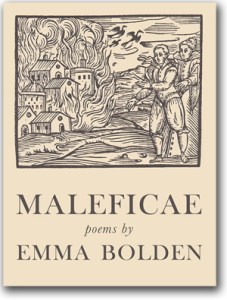 Maleficae
Maleficae
Poetry
GenPop Books, 2013
During the European witch trials, over one hundred thousand people were prosecuted for maleficia. The vast majority were women. Many were unmarried. Many owned property. Some were midwives who counseled village women about their health, their pregnancies, and their marriages. Others were simply non-conformists. Maleficae tells the story of one so-called witch: a woman who, like many others, was once seen as her village’s savior, but became the focus of the villagers’ fear and rage when disaster struck.
This book-length series of poems seeks to re-create the terror and inhumanity of the trials. Incorporating language from trial records to papal bulls to incendiary theological documents, these poems explore the intersection of forces that led to the persecution of people who were deemed different and therefore dangerous—forces alarmingly similar to those still operating today. At the center of all of this is the woman who was called a witch: her story, her wail from the center of the flames. In allowing her new testimony, in allowing the dead to speak, Maleficae gives voice to the voiceless victims of the trials.
In this incantatory series of lyric poems Emma Bolden finds a new way to write about an old (though still current) subject. This book speaks in many tongues, many vivid, and living tongues.
—Thomas Lux
Emma Bolden’s Maleficae is an ambitious and powerful accomplishment. Informed by historical records of European witchcraft trials, it is wholly contemporary in its layered complexity and poetic craft. Incantatory rhythms, shifting perspectives and voices, and vividly rendered dream/nightmare imagery make these poems hypnotic and haunting. The contrast between historical content and contemporary form—between fact and imagination—intensifies the dramatic impact and reminds us that the past is, in one form or another, always present.
—Eric Nelson
Lust, freedom, repression, sin, shame. The fearful, oppressive denial of female empowerment and agency. Maleficae has all the conceptual intelligence of a Feminist study, but it makes its argument via artful imagined experience. This is a poetry “possessed” of a musical and rhetorical mastery that cast their own incantatory spell, compelling us to feel the thin membrane between modernity and our past, between pragmatism and inner mystery. It made me think of those Anne Sexton poems that utilize and transcend her confessionalism, speaking not just for herself, but for all women.
—Mark Cox
Some centuries back Emma Bolden would have been burned at the stake as a witch. For similar reasons, her poetry insists on such intimacies that we are not going to be who we were by the time she is done with us. Audacious to attempt poems that would show us ourselves as we are, filled with the lust of the hunt… the terror of the taking, if indeed we would ever confess. Only the few who show up every now and then with the genius that demands they sacrifice their lives to the craft of making a poem even come close to making us see ourselves. Bolden’s Maleficae freely achieves nothing less than impossibly holding our very souls before us, again and again and again and again.
—Louie Skipper
Chapbooks
Geography V
Literary nonfiction
Winged City Press, 2014
Available for purchase from Argus House Press and Amazon
This Is Our Hollywood
Poetry
Published in The Chapbook, Volume 2, along with chapbooks by Patti White, Jessica Smith, Laura Hendrix Ezell, Michael Martone, Jennifer Horne, and Jim Hilgartner, 2013
Available for purchase from The Chapbook and Amazon
Poetry
dancing girl press, 2008
Available for purchase from dancing girl press and studio
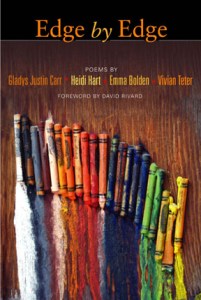 How to Recognize a Lady
How to Recognize a Lady
Poetry
Published in Edge by Edge, the third in Toadlily Press’ Quarter series, along with chapbooks by Gladys Justin Carr, Heidi Hart, and Vivian Teter, 2007
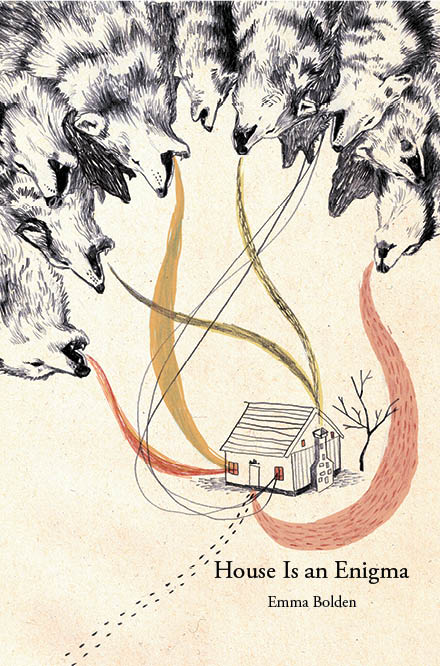
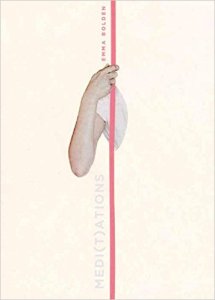
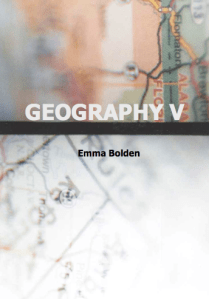
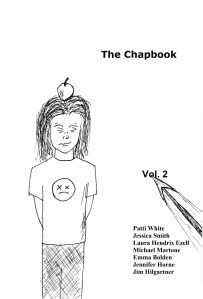
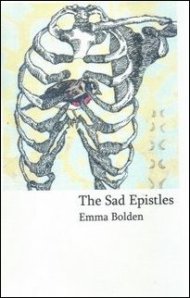
One response to “Books”
[…] Bolden’s new book of poetry, Maleficae (Genpop Books), is about the European witch trials. She really did attend a school called Our Lady […]